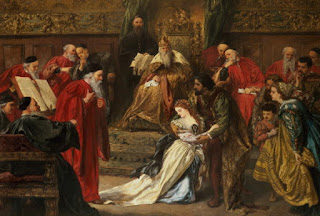“Lear is not a particularly likeable character, but the play encourages us to feel profound sympathy for him, and take his side.”
Discuss with reference to William Shakespeare’s “King Lear”.
William Shakespeare’s “King Lear” opens the readers’ minds by showing that there are two sides to every story. We experience a range of different emotions from contempt to pity towards the main character, King Lear, as the play evolves. We feel that he is an unlikable character as his negative traits such as cruelty, lack of regard for others, arrogance and foolishness are displayed at the beginning of the play. As the play progresses, we explore the actions of those closest to Lear and begin to empathise with the old and weak former king.
We first see Lear’s vanity and the resulting cruelty towards Cordelia in the first scene of the play. His way to solve a problem is to invent a vain game that feeds his ego. “Which of you shall we say doth love us most?” he asks his daughters. It shows us that Lear values compliments and false-adoration more than true love. When Cordelia’s honest response does not please him, he over-reacts and cruelly banishes her as his daughter: “As a stranger to my heart and me hold thee from this forever.” This immediately makes us aware of King Lear’s cruelty and lack of rationality, which makes us dislike him. He continues to speak cruelly of Cordelia when the King of France refers to her as his daughter. He replies with “we have no such daughter, nor shall we ever see that face of hers again!”Lear’s cruelty is also revealed to us when Kent is trying to make him realise the foolishness of his actions. “Thy hideous rashness! [..] Thy youngest daughter does not love thee least!” Kent tells him. Lear’s response; “Kent, on thy life, no more.” and “Out of my sight!” show us his stubborn foolishness, and make us strongly dislike him.
The love test itself also reveals Lear’s blatant foolishness to the audience. He easily falls for Goneril and Regan’s extravagant exclamations of ‘love’ such as “Sir, I love you more than word can wield the matter,” and “I am alone felicitate in your dear highness’ love.” Lear’s arrogance and need for validation are unlikable trait in the character. Lear once again ignores advice of those who are looking out for him when the fool tells him “Thou maddest thy daughters thy mothers.” He is too stubborn to realise this. He continuously refuses to face reality. He tells Goneril “I have another daughter who, I am sure is kind and comfortable” when she no longer welcomes him in her house. While it is obvious to us from the start that Goneril and Regan are two of a kind, Lear is frustratingly unaware of this. He then tries to selfishly turn them against each other by telling Goneril “When she shall hear this of thee, with her nails she’ll flay thy wolfish visage.” This is a very chid-like maneuvre: I will tell mammy and she will give out to you. Lear’s opinion of his own daughter is entirely predetermined by his perception of her attitude towards him. This is incredibly self-centred: he genuinely thinks the world revolves around him.
Lear’s insults continue when he disowns Goneril, calling her a “degenerate bastard!”and cursing her by saying “from her derogate body never spring a babe to honor her!” This is a disrespectful move on Lear’s part as the reason for her banishment is the fact that she will not allow Lear to have a hundred knights. Lear is no longer King, so he has no excuse at all to be aloof and unreasonable, yet he continues to act arrogantly and impatiently in the homes of his daughters: “Go tell the duke and ’s wife I’d speak with them— Now, presently.” His arrogance is, once again, demonstrated when he finds Kent in the stocks. “What’s he that hath so much thy place mistook to set thee here?” Instead of sympathising with Kent, he immediately is appalled at the idea of someone putting his servant into the stocks. Lear’s repeatedly demonstrates his negative traits causing us to dislike him.
While Lear is at fault, many of the other characters have also acted cruelly and disrespectfully towards him. This causes us to feel more sympathy for him as the play progresses. This is particularly the noticeable with Regan and Goneril. Goneril tells her servants to “put on what weary negligence you please,” when Lear is staying with her. She intends for Lear to have a miserable time whilst in her house. Regan acts in the same way when he is with her, and then tells her servants to lock him out in the storm: “Shut up your doors.” His daughters’ cruelty show us that they do not respect him as a father and are not thankful for the land he has given him. This makes us pity Lear, and we begin to feel stronger dislike towards Goneril and Regan, rather than him. What makes us feel even more sympathy for Lear are his daughters’ motives. They are not only acting maliciously towards him because of his actions, but they also recognise the fact that he is weak and getting old. “O Sir, you are old. Nature in you stands on the very verge of her confine,” Regan says to him. This shows us that his daughters still disrespect him despite the fact that they know he is weak. At this point we begin to take Lear’s side over his daughters’.
We profoundly commiserate with Lear because of his old-age and weakness especially when he is out in the storm. A Gentleman reports Lear’s situation to the audience, telling us that he is “contending with the fretful elements” and that they “tear his white hair which the impetuous blasts with eyeless rage.”We, at this point, feel sympathy for him because we hear of the extremity of the storm. The use of the words “white hair” also remind us of his age, and that makes us feel even more sorry for him. Lear is full of self-pity during the storm: “Here I stand, your slave, a poor, infirm, weak and despised old man.” We can see that his self-confidence has plummeted and that he has truly been weakened by the actions of his daughters.
As the storm continues we can see that Lear is beginning to go mad. “My wits begin to turn,” he says, and it is confirmed to us again by Kent who tells Gloucester “his wits begin t’unsettle.” We feel profound sympathy for Lear because of the negative effect that his daughters have had on his character. His insanity is clearly exhibited to us during the mock trial scene. He begins to speak to inanimate objects, such as stools, treating them like members of the trial. “‘Tis Goneril. I here take my oath before this honorable assembly, she kicked the poor King her father.” It is quite saddening to see Lear’s madness so blatantly in front of us.The cause of it is so obvious, even he recognises it. We see his identity confusion, as he refers to himself, almost paradoxically, as “the poor King her father.” It makes us want to console Lear, and also gives us the desire to see Goneril and Regan being defeated. We lastly feel profound sympathy for Lear when he recognises his madness and foolishness before Cordelia. He apologises to her saying “I am a very foolish fond old man, […] I fear I am not in my perfect mind,” and “Pray you now, forget and forgive, I am old and foolish,” not long before they both die. We truly feel sadness and pity towards his foolish actions, in contrast to the frustration we felt towards them at the beginning of the play.
At the beginning of ‘King Lear’, Lear’s traits such as cruelty, arrogance, foolishness and lack of respect for others cause us to feel frustration and strong dislike towards him. However, as the play progresses, we see the cruelty he was subjected to by other characters. We begin to pity Lear and take his side, hoping to see the downfall of the characters who have been against him. Unfortunately, as in many of Shakespeare’s tragedies, we do not get to see the main character’s victory as we would have hoped. We are left with a feeling of profound sympathy for the character, even after the play ends.
You may also like:
King Lear Sample Answer: Honour, Loyalty, Brutality and Viciousness
King Lear Sample Answer: Imagery, Characters and Themes
King Lear Sample Answer: Imagery, Characters and Themes
|
Leaving Cert English Sample Essay and Notes
|



